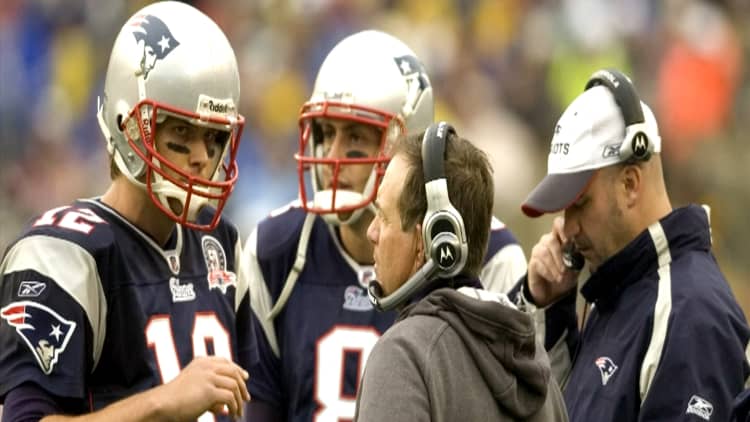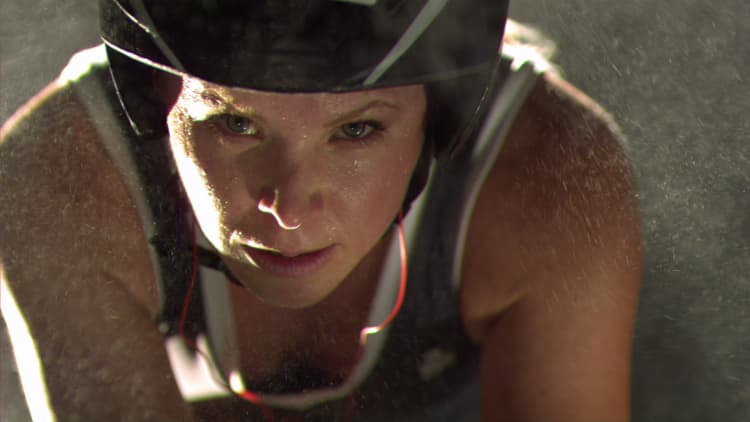A half-pipe course lasts about 22 seconds. Alpine skiers fly through the air for five seconds. Figure skaters complete three twirls in a breath.
During the 2018 Winter Olympics, which kick off in a month, athletes will have a handful of very brief moments to show the world what they have spent their lifetimes training for.
That means pressure.
If you think Olympians are impervious to pressure, according to mental coach Graham Betchart, you're wrong. "Every human being feels these feelings," he tells CNBC Make It. What the best do is take the necessary steps to thrive, rather than fold, when that moment finally arrives.
Since receiving his masters in sports psychology from John F. Kennedy University in 2008, Betchart has helped train countless athletes in mental toughness, including UFC fighters, NFL players and three recent NBA No. 1 draft picks — the Philadelphia 76ers' Ben Simmons, as well as the Minnesota Timberwolves' Karl-Anthony Towns and Andrew Wiggins. He's currently designing the mental training program for U.S.A. Basketball's youth program.
Here are the three steps, he says, that Olympians take to perform in a pressure situation:
1. Get comfortable being uncomfortable
"You have to find a way to get into the moment, get into your body, trust your training," he says, "even though literally everything is on the line and the entire world is watching." This is where the training comes in, because it takes years of preparation to stay calm in uncomfortable situations.
"If you've never experienced feeling a little vulnerable or being uncomfortable, and you've always resisted that feeling... that's going to sabotage your performance," says Betchart.
So don't resist. "Welcome it in," says Betchart. "Then what you find is: What your afraid of is not as big a deal. What makes it a big deal resisting it."
The sports psychologist offers one anecdote from a personal experience. "Before my wife gave birth, I'm not telling her everything's going to feel great," he says. Instead, he told her: "You know the deal. This is a legendary uncomfortable moment. But if you embrace it, that takes away the panic, the anxiety and the fear. You're still going to be uncomfortable, but you don't have the anxiety. And that allows you to perform."
2. Reframe your feelings
Being okay with a discomfort is one thing, but, to take this a step further and truly thrive under pressure, you need to reframe what you are feeling in a positive light. "Reframing is everything," says Betchart.
"The really good basketball players have told themselves it's not nervousness [that they're feeling]. They've told themselves it's excitement and joy."

On the free throw line late in the game, a basketball player feels the same pressure that you might. People tend to think otherwise, but that's a misconception, says Betchart.
"In reality, they feel the same. They just tell themselves their feelings are something else."
They decide their feelings are not just okay, but are in fact more than okay — are actually positive — and that allows them to excel under pressure.
3. Feed off the energy around you
For Olympians, when the real moment arrives, the best will outdo what they can in practice.
Take the two-time Olympic gold medalist Shaun White, for example. In an interview with Tom Bilyeu on Impact Theory, he explains why he gets so much more air at events than in practice. He won gold and set a new record at the 2013 Winter X Games for going 24 feet out of a half pipe. At the Burton U.S. Open in Vail in 2016, he went 26 feet up, setting a new record.
"It just kind of comes out of you," he tells Bilyeu. "I strive for those moments and wish I could recreate them in a normal life setting."
But, according to Betchart, "White could never replicate [that] energy."
It's the same for the Orlando Magic's Aaron Gordon, a player Betchart has trained since Gordon was a young teen. During the 2016 NBA Dunk contest, he jumped over the Orlando mascot, Stuff the Magic Dragon, put the ball through his legs, and jammed it home. Though he left without a trophy, he won the crowd and was decidedly dubbed "the people's champ."
"Gordon could never replicate the energy of how high he could jump during that first dunk contest," says Betchart. "That was provided by the fans. You can't get that high in practice. It's impossible."
This doesn't just apply to NBA superstars and Olympic athletes. It's relevant to any high-stakes situation. In fact, as the director of mental training at Lucid Performance, Betchart works directly with professionals in various other fields, like surgeons, salespeople and lawyers.
"What we've found is this is much larger than sports," he says. "This is about everyone in life."
Like this story? Like CNBC Make It on Facebook.
Don't Miss: Mental coach of 3 top NBA draft picks shares 7 ways you can thrive under pressure
Video by Jonathan Fazio




